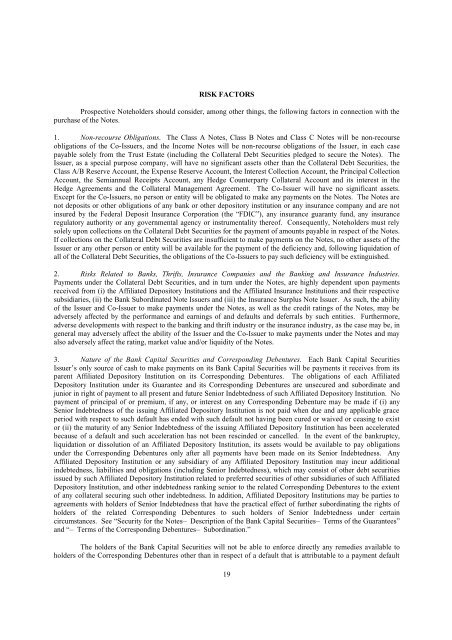MMCapS XVII Final Offering Circular - Irish Stock Exchange
MMCapS XVII Final Offering Circular - Irish Stock Exchange
MMCapS XVII Final Offering Circular - Irish Stock Exchange
Create successful ePaper yourself
Turn your PDF publications into a flip-book with our unique Google optimized e-Paper software.
RISK FACTORS<br />
Prospective Noteholders should consider, among other things, the following factors in connection with the<br />
purchase of the Notes.<br />
1. Non-recourse Obligations. The Class A Notes, Class B Notes and Class C Notes will be non-recourse<br />
obligations of the Co-Issuers, and the Income Notes will be non-recourse obligations of the Issuer, in each case<br />
payable solely from the Trust Estate (including the Collateral Debt Securities pledged to secure the Notes). The<br />
Issuer, as a special purpose company, will have no significant assets other than the Collateral Debt Securities, the<br />
Class A/B Reserve Account, the Expense Reserve Account, the Interest Collection Account, the Principal Collection<br />
Account, the Semiannual Receipts Account, any Hedge Counterparty Collateral Account and its interest in the<br />
Hedge Agreements and the Collateral Management Agreement. The Co-Issuer will have no significant assets.<br />
Except for the Co-Issuers, no person or entity will be obligated to make any payments on the Notes. The Notes are<br />
not deposits or other obligations of any bank or other depository institution or any insurance company and are not<br />
insured by the Federal Deposit Insurance Corporation (the “FDIC”), any insurance guaranty fund, any insurance<br />
regulatory authority or any governmental agency or instrumentality thereof. Consequently, Noteholders must rely<br />
solely upon collections on the Collateral Debt Securities for the payment of amounts payable in respect of the Notes.<br />
If collections on the Collateral Debt Securities are insufficient to make payments on the Notes, no other assets of the<br />
Issuer or any other person or entity will be available for the payment of the deficiency and, following liquidation of<br />
all of the Collateral Debt Securities, the obligations of the Co-Issuers to pay such deficiency will be extinguished.<br />
2. Risks Related to Banks, Thrifts, Insurance Companies and the Banking and Insurance Industries.<br />
Payments under the Collateral Debt Securities, and in turn under the Notes, are highly dependent upon payments<br />
received from (i) the Affiliated Depository Institutions and the Affiliated Insurance Institutions and their respective<br />
subsidiaries, (ii) the Bank Subordinated Note Issuers and (iii) the Insurance Surplus Note Issuer. As such, the ability<br />
of the Issuer and Co-Issuer to make payments under the Notes, as well as the credit ratings of the Notes, may be<br />
adversely affected by the performance and earnings of and defaults and deferrals by such entities. Furthermore,<br />
adverse developments with respect to the banking and thrift industry or the insurance industry, as the case may be, in<br />
general may adversely affect the ability of the Issuer and the Co-Issuer to make payments under the Notes and may<br />
also adversely affect the rating, market value and/or liquidity of the Notes.<br />
3. Nature of the Bank Capital Securities and Corresponding Debentures. Each Bank Capital Securities<br />
Issuer’s only source of cash to make payments on its Bank Capital Securities will be payments it receives from its<br />
parent Affiliated Depository Institution on its Corresponding Debentures. The obligations of each Affiliated<br />
Depository Institution under its Guarantee and its Corresponding Debentures are unsecured and subordinate and<br />
junior in right of payment to all present and future Senior Indebtedness of such Affiliated Depository Institution. No<br />
payment of principal of or premium, if any, or interest on any Corresponding Debenture may be made if (i) any<br />
Senior Indebtedness of the issuing Affiliated Depository Institution is not paid when due and any applicable grace<br />
period with respect to such default has ended with such default not having been cured or waived or ceasing to exist<br />
or (ii) the maturity of any Senior Indebtedness of the issuing Affiliated Depository Institution has been accelerated<br />
because of a default and such acceleration has not been rescinded or cancelled. In the event of the bankruptcy,<br />
liquidation or dissolution of an Affiliated Depository Institution, its assets would be available to pay obligations<br />
under the Corresponding Debentures only after all payments have been made on its Senior Indebtedness. Any<br />
Affiliated Depository Institution or any subsidiary of any Affiliated Depository Institution may incur additional<br />
indebtedness, liabilities and obligations (including Senior Indebtedness), which may consist of other debt securities<br />
issued by such Affiliated Depository Institution related to preferred securities of other subsidiaries of such Affiliated<br />
Depository Institution, and other indebtedness ranking senior to the related Corresponding Debentures to the extent<br />
of any collateral securing such other indebtedness. In addition, Affiliated Depository Institutions may be parties to<br />
agreements with holders of Senior Indebtedness that have the practical effect of further subordinating the rights of<br />
holders of the related Corresponding Debentures to such holders of Senior Indebtedness under certain<br />
circumstances. See “Security for the Notes— Description of the Bank Capital Securities— Terms of the Guarantees”<br />
and “—Terms of the Corresponding Debentures— Subordination.”<br />
The holders of the Bank Capital Securities will not be able to enforce directly any remedies available to<br />
holders of the Corresponding Debentures other than in respect of a default that is attributable to a payment default<br />
19
















